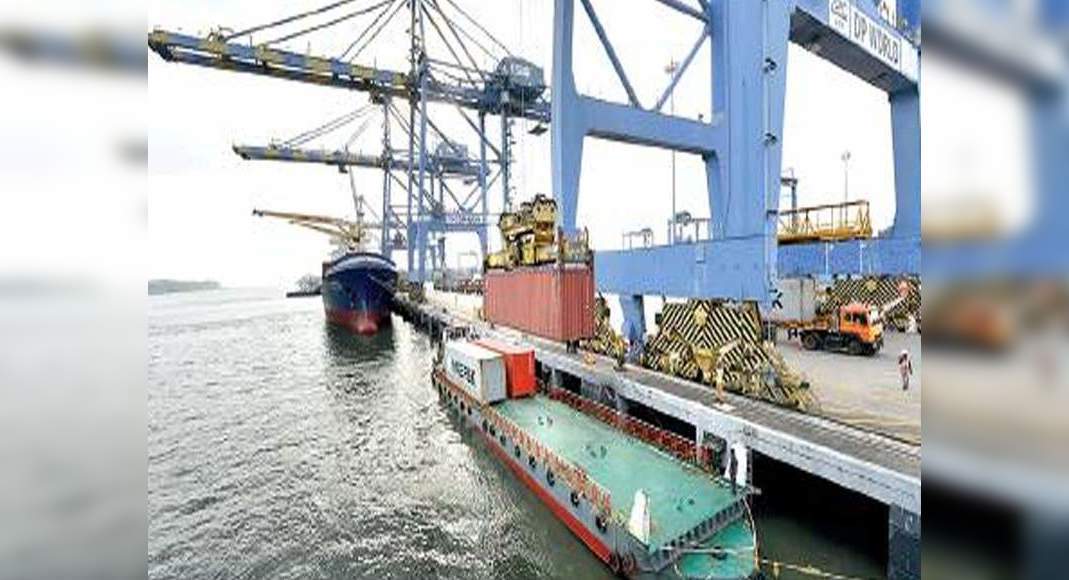CHENNAI: For years the Union government was content with controlling the major ports across the country.
It allowed states to notify and control the minor ports, despite the subject being part of the concurrent list that allows the Centre to have a say.
That situation could change now, with the Centre moving ahead with the Indian Ports Bill, 2021.
Through this proposed law, the Union government wants to have complete control over all sea ports, including the authority to decide who can operate and manage them.
The development has rattled the states, especially most of the coastal states from Gujarat on the western coast to West Bengal on the eastern side.
They fear this as yet another attempt by the Centre to usurp power of the states to create imbalance in the federal set-up.
The nine coastal states include those ruled by the BJP such as Gujarat, Goa and Karnataka.
Tamil Nadu was the first to raise the red flag, while Odisha soon followed by raising objections to certain provisions or non-provisions in the new bill.
On June 22, chief minister M K Stalin reached out to CMs of nine coastal states, urging them to express their objection to the new draft Indian Ports Bill, 2021, and take joint action to prevent any move to dilute the powers vested with the states as per the Indian Ports Act, 1908.
Till now state governments had the power to plan, develop, regulate and control minor ports, the new bill proposes to transfer many of these powers to the Maritime State Development Council (MSDC), which has so far been an advisory body.
K Ashok Vardhan Shetty, a former IAS officer and former vice-chancellor of the Indian Maritime University, Chennai, says the draft Indian Ports Bill 2021 contains some good parts such as provisions for safety and security of Indian ports and prevention and containment of pollution at ports, which ensure compliance with India’s obligations under various maritime treaties and international instruments.
“But Chapters II and III dealing with the MSDC are controversial,” he said.
Set up in 1997 with the Union minister for shipping as chairman and the ministers in charge of ports of the maritime states as members, the MSDC functions as an apex advisory body for the coordinated development of major and non-major ports.
It makes suitable recommendations to the concerned ministries about infrastructure such as roads, rail and inland waterway transport.
While it is understandable to grant statutory status to the MSDC, its composition as per the draft bill is overtly weighted in favour of the Centre.
Either the MSDC should have only the Union minister for shipping and other ministers from maritime states as members with civil servants as special invitees, or the secretaries in charge of ports in the maritime states along with the nine joint secretaries of the Union government — in the interests of fairness and balance, he said.
According to Shetty, if the performance of non-major ports, over the years, had been unsatisfactory, then the present move could be justified.
“The major ports’ share of cargo moved has come down from 92% in 1993-94 to 54% in 2020-21, whereas the non-major ports’ share has gone up from 8% to 46% over the same period.
Non-major ports are well set to overtake major ports in a couple of years,” he said.
Further, the operating efficiency of many smaller ports is better than that of major ports.
States like Gujarat, Andhra Pradesh, Maharashtra and Tamil Nadu achieved this by granting concessions to the private sector to operate the non-major ports.
The Union government too is now towing this line by shifting the major ports from the old service ports model to the landlord ports model, wherein terminals are being operated by private parties, besides outsourcing port functions.
The present combined capacity of all the major ports put together is about 1,500 million tonnes per annum (MTPA), whereas the total cargo moved is only about 700 MMTPA, reflecting a capacity utilisation of a mere 47%.
Moreover, the Union ministry of shipping is strapped for cash and its annual budget is less than `2,000 crore.
“The move to bring the non-major ports under what appears to be the administrative control of MSDC is unjustified.
Apart from stifling the initiatives of the maritime states, it is likely to create more bureaucratic hurdles in capacity addition and functioning.
It is also likely to curtail competition to the benefit of the existing players,” Shetty said.
That is why the industry is also rattled, given the monopolistic rise of one conglomerate.
While a majority of projects are awarded to a qualified bidder offering the highest revenue share to the government through a transparent process, the assets are transferred back at the end of the concession period, making them truly national/state assets.
But the reality is different.
“It is common for original concessionaire to share certain equity stake with private/public entities for capacity augmentation of ports.
But recent transactions involving large conglomerates, taking control of port assets by making the concessionaires cede control without any need for price discovery is raising concerns,” said an industry source.







